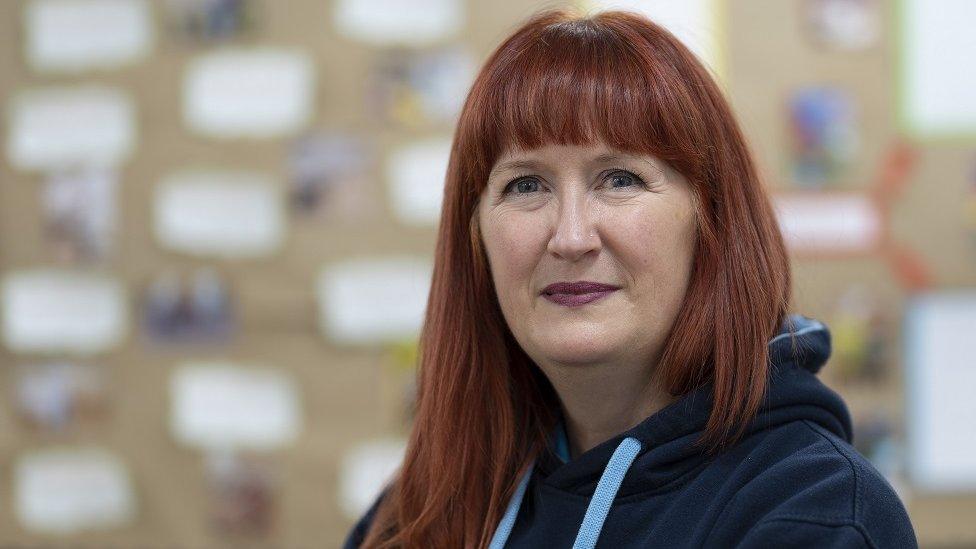Cost of living: Childcare fees mean mum makes £2 on overtime shift
- Published
"When I balance my wage against the cost of childcare, I would make £2 a day"
A mother of two said she only makes £2 a day when she works overtime due to the rising cost of childcare fees.
Louise Morgan, from Swansea, wants to work more hours to advance her career, but said it was not worth the financial cost.
The 33-year-old said she felt left behind and would get overlooked as "I'm only there three days a week".
The Welsh government said all workers should have an automatic right to request flexible working.
Ms Morgan lives with her partner Josh Doyle and their sons Dexter, three, and two-year-old Teddy.
She is a part-time admin officer and wants to work full time to make more money and progress in her career, but even with government help, it is not worth it.
Childcare for Dexter and Teddy is £71 a day and Ms Morgan makes £73 when she works overtime.

Louise Morgan fears her career prospects will be hampered as she can only work part-time hours
She said Josh, who is a self employed carpenter, worked six days a week, sometimes seven, and wants to work more shifts, especially with Christmas coming up as she wants "to spoil" her sons.
The Welsh government provides 30 hours of free childcare a week, external for working parents of three and four-year-olds.
While Ms Morgan said the creche her children attends is "amazing", her friends react with horror when they hear the cost.
"They're like... 'You can go on holiday every month for that'," she told BBC Wales Live.

Nursery owner Nikola Masters says staffing is her highest outgoing
Nikola Masters owns Osbourne Lodge Day Nursery in Pontypool, Torfaen.
She said the 10% rise in minimum wage, coupled with increasing food bills and a "three-fold increase" in gas and electricity costs meant her outgoings would be £40,000 more next year.
Ms Masters said she "had to pass that on" in the form of increased fees.
"If we can't increase our fees, we can't run and parents can't get to work. The average outgoings for a day nursery is 75-80% on staff wages.
"Parents generally see the person they hand the child over to, they don't see the bigger cost of what goes on behind the scenes, and the immense amount of admin that we need to complete on a daily basis."

Louise Morgan and her partner Josh Doyle have two sons - Teddy and Dexter
The Welsh government said it had already announced an extra £6m per year to pay childcare providers £5 per hour, up from £4.50, from April.
The maximum amount nurseries can charge for food has also increased from £7.50 a day to £9.
Ms Masters said nurseries were not just baby sitters, but places where children can learn.
"A child can learn wonderful things at home, but what they learn is their family's knowledge. When you bring a child into a community with other children, different adults, different carers, that child is opened up to a whole new world of development."
Jonathan Broadberry, head of policy at the National Day Nursery Association, said nurseries faced a raft of rising costs.
"You can't turn the heating off in the nursery. You can't not feed the children so these are costs where you can't make savings."
Mr Broadberry said either parents would be paying more or government rates had to keep pace with the increase in costs.
Claire Protheroe, the national manager of Professional Association for Childcare and Early Years Cymru, said childcare providers faced "a crisis".
"Mortgage and rent increases are impacting on many and actually forcing the closure of some.
"We've seen a decline in childminder numbers in Wales in the last year by around 14% alone. It's drastic."
Sarah Rees, head of Oxfam Cymru, said affordable childcare was the "basis of support that we need to enable people to go to work".
She added: "You can earn more money working in supermarkets rather than taking care of the most precious people in our lives."

CHALLENGING MISCONCEPTIONS: Life in Britain’s biggest special school
BORN DEAF, RAISED HEARING: What it means to live in two different worlds

- Published28 November 2022

- Published16 November 2022

- Published11 November 2022
